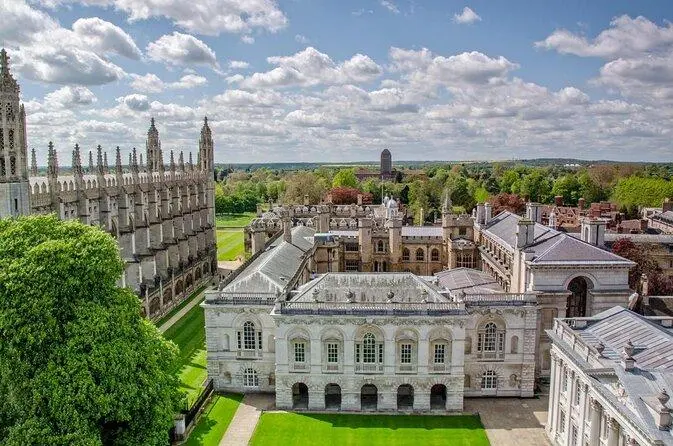Get Admitted to your Dream University – CAMBRIDGE

University of Cambridge (Cambridge University) is a public collegiate research university in Cambridge, England. Founded in 1209 and granted a royal charter by Henry III in 1231. The university was founded from a variety of institutions, including 31 semi-autonomous constituent colleges and over 150 academic departments, faculties, and other institutions organized into six schools. All the colleges are self-governing institutions within the university, managing their own personnel and policies, and all students are required to have a college affiliation within the university.
The university does not have a main campus, and its colleges and central facilities are scattered throughout the city. The university operates eight cultural and scientific museums, including the Fitzwilliam Museum and Cambridge University Botanic Garden. Cambridge’s 116 libraries hold a total of around 16 million books, around nine million of which are in Cambridge University Library, a legal deposit library and one of the world’s largest academic libraries.
The university occupies a central location within the city of Cambridge with the students taking up roughly 20 percent of the town’s population. Other notable buildings include King’s College Chapel, the history faculty building, and the Cripps Building at St John’s College. Cambridge is defined as a collegiate university, meaning that it is made up of self-governing and independent colleges, each with its own property and income. Within each faculty, school, or department within the university, are academics from many differing colleges.
REQUIREMENTS
International applicants for Cambridge University should have very strong academic performance from grades X – XII. The exact grade requirement depends on the Board in which the students are studying.
- CISCE and NIOS – Applicants will require scores of 90% or higher in five or more relevant subjects.
- IB – Typical offers are 40-42 points out of 45, with 776 in Higher Level subjects. Some Colleges may require 777 and/or higher points total for some courses and applicants may be required to achieve 7 in particular subjects.
- International A Levels – Standard Level subjects will satisfy AS Level subject requirements. Higher Level subjects will satisfy A Level subject requirement.
- CBSE – Applicants will require five or more A1 grades in relevant subjects.
- Indian State Boards – Applicants will be considered on a case-by-case basis, however applicants will typically require scores of 95% or equivalent in five or more relevant subjects.
Cambridge University conducts entrance tests for most of its courses. So, in addition to achieving high grades, students also need to do well in their test(s). Students applying from India must appear for the following additional tests to make their profiles stand out. Students from other countries may check out their country-specific requirements on the university page.
College Board Advanced Placement Tests – the requirement is for a minimum of five AP Test scores at Score 5. AP Tests should be taken in subjects that have a particular focus on subjects related to the course applied for. The offers for all Cambridge courses may be made conditional on achieving grades of 5 in five or more AP Tests.
IIT-JEE (Advanced) – offers for Chemical Engineering, Engineering, Natural Sciences (Physical) may be made conditional on a rank of <2000 in the IIT JEE (Advanced).
STEP – offers for Mathematics will be conditional on achievement in the Sixth Term Examination Paper (STEP). STEP may also be required for offers for other subjects, such as Computer Science, Engineering, and Economics, where attainment equivalent to A Level Mathematics and/or Further Mathematics cannot be demonstrated by any other means.
Regardless of the curriculum type, IGCSE, IB, CBSE, ISC etc. academic scores are a high priority when you are looking to study at the University of Cambridge. The other aspects of the application, such as online courses, activities, and community service are secondary. So, it is crucial for students to have stellar grades, especially in their core subjects.
Cambridge University appreciates Research Papers written by the students in the subject/field of their interest to show their sincerity and diligence. The level of commitment it requires adds credit to your whole application and sets you apart from other applicants. These papers should reflect the understanding of A Level/IB (or equivalent) courses.
These should be as submitted to, and marked by, your teachers. A discussion of this work may then form part of your interview. You will be asked to complete a cover sheet to verify it’s your own work and provide details of the circumstances in which it was written and a contact teacher.
In addition to the grades and test performance and interview, Cambridge University requires the student’s Personal Statement (SOP) and two reference letters. It is important to note that admissions offered by Cambridge University are conditional, meaning that a student needs to fulfill the university’s requirements for admission. For e.g., if a student’s predicted score does not match their final score in Grade XII, the university has the right to revoke admission.
It’s essential that your English language skills are good enough for you to undertake an intensive and challenging academic course that’s taught and examined in English. Therefore, Cambridge University requires English Proficiency Test scores.
You can appear for any one of the following tests:
TEST | MINIMUM SCORE REQUIRED |
IELTS Academic | An overall band of at least 7.5 or 7 and above band in each section. |
TOEFL (IBT) | An overall score of at least 110 or at least a score of 25 in each section. |
Cambridge English C2 Proficiency | An overall of 200 with no element lower than 185. |
Cambridge English C1 Advanced | An overall of 193 with no element lower than 185, plus an assessment by the Language Centre. |
Singapore Integrated Programme (SIP) | It may be considered an acceptable English language qualification |
CAMBRIDGE ASSESSMENT ADMISSIONS TESTING (CAAT)
CAAT provides admissions tests for a range of university level courses and assessments in thinking skills and behavioral styles. It is part of Cambridge Assessment, a not-for-profit department of the University of Cambridge. The university demands entrance exams for nearly all the courses and not just in the fields of medicine, law, engineering, history, etc.
Let’s discuss each of these tests in detail:
SUBJECT(S) | TEST | REGISTRATION DATE* | FORMAT OF THE TEST |
Law | Law National Aptitude Test (LNAT) | 15 September | Section 1: Argumentative Passages 95 min – MCQs Section 2: Writing Essay – answer any 1 out of 3 essays (argue economically and provide a conclusion) – require good command of written English 40 min |
Computer Science, Maths, Economics | Test of Mathematics for University Admission (TMUA) | 30 September | Section 1: Applications of Mathematical Knowledge 75 min – MCQs Section 2: Mathematical Reasoning 75 min – MCQs |
Engineering | Engineering Admissions Assessment (ENGAA) | 15 October | Section 1: Maths & Physics (part A), Advanced Maths & Advanced Physics (part B) 60 min – MCQs Section 2: Advanced Physics 60 min – MCQs |
Medicine | BioMedical Admissions Test (BMAT) | 30 September | Section 1: Thinking Skills 60 min – MCQs Section 2: Scientific Knowledge & Applications 30 min – MCQs Section 3: Writing Task (attempt 1 out 3 questions based on general, scientific or medical interest) 30 min |
Natural Sciences, Veterinary Science, Chemical Engineering, Biotechnology | Natural Sciences Admissions Assessment (NSAA) | 30 September | Section 1: Math and one Science (Bio, Chem, Phys) 60 min – MCQs Section 2: Bio, Chem, Phys 60 min – MCQs |
Mathematics | Mathematics Admissions Test (MAT) | 30 September | Only 1 section: A Level Mathematics 150 min |
Engineering, Politics & Economics, Linguistics, Experimental Psychology, Geography, Human Sciences, Philosophy, Psychology, and Philosophy | Thinking Skills Assessment (TSA) | 30 September | Section 1: Thinking Skills Assessment 90 min – MCQs Section 2: Writing Task 30 min |
Physics | Physics Aptitude Test (PAT) | 30 September | Only 1 section: Physics and Mathematics 120 min – MCQs |
*The exact dates may change with each passing year.
It is indeed quite a challenge to get admitted to this esteemed university, but by following the above-mentioned steps, you can increase your chances of getting admitted to the University of Cambridge.
About the Author:

Ankita is an Admissions Specialist & Editor at Scholarly, and has 4 years of experience in study abroad. She has a Masters degree in English Literature from University of Delhi. Ankita is an ardent reader who enjoys fiction and composes personal poetry. Her interests lie in learning more about the ancient history of the world and how she can pen down the experiences she gains in her life as articles.
Scholarly helps ambitious international students locate the right universities and courses to pursue their education. We provide college credit courses and research papers to students that want to learn more and differentiate themselves. We help students develop and present their best version to their dream university. Our recommendations are based on the student’s field of interest, academic performance, financial resources and career plans. We provide test preparation classes from the best teachers to help improve scores and thus the prospects for admission. We also assist students with their visa and loan applications to reduce the anxiety associated with international education.
For additional questions about international education, choice of majors, university selection or admission strategies please visit the Questions section of our website.

 Previous Post
Previous Post Next Post
Next Post
